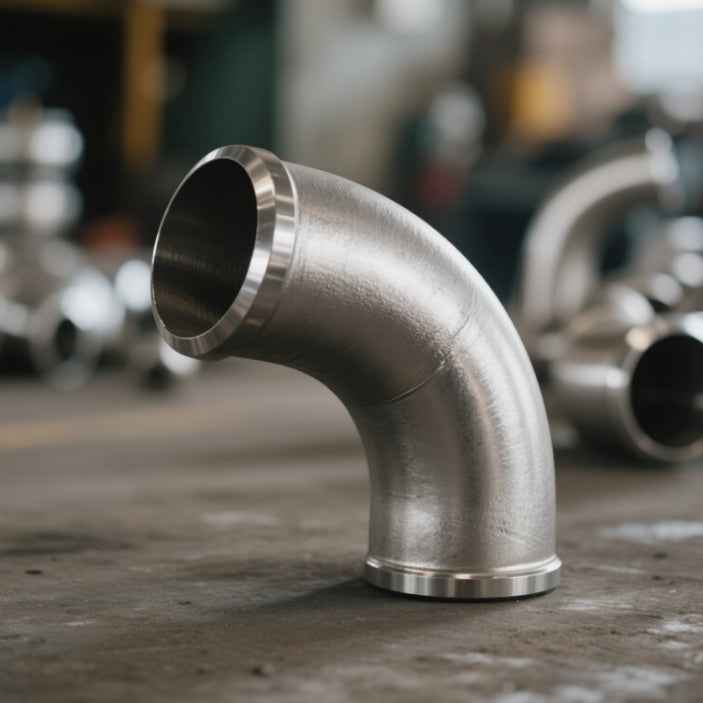StockSteel
Ultimate Stainless Steel 90 Degree Elbow | ANSI-Certified
Ultimate Stainless Steel 90 Degree Elbow | ANSI-Certified
Couldn't load pickup availability
Ultimate Stainless Steel 90 Degree Elbow | ANSI-Certified
Product Specifications
| Attribute | Details |
|---|---|
| Material Grades | 304 stainless steel 90 degree elbow (304, 316L, 321), stainless steel tubing elbows (seamless/welded) |
| Diameter Range | 1/2" to 48" (DN15–DN1200) |
| Wall Thickness | SCH5S, SCH10, SCH40, SCH80, XXS (Customizable) |
| Surface Finish | Mirror Polished, Electro-Polished, HL (Hairline), Sandblasted |
| Hardness (HV) | 150–220 (Annealed), 250–320 (Cold-Rolled) |
| Tensile Strength | ≥520 MPa (304), ≥860 MPa (316L) |
| Yield Strength | ≥205 MPa (304), ≥450 MPa (316L) |
| Operating Temperature | -50°C to 800°C (Short-term: 900°C) |
| Certifications | ANSI B16.9, ASME B16.11, DIN 2605, ISO 9001, 3A Sanitary (Food Grade) |
| Connection Type | Butt-Weld, Threaded, Grooved, Tri-Clamp (Sanitary) |
Technical Properties
Tensile & Bend Strength
Our stainless steel tubing elbows are engineered for high-pressure industrial systems. The tensile strength of 304-grade elbows exceeds 520 MPa, ensuring structural integrity in corrosive environments like chemical plants or marine exhaust systems. For 1 1/2 stainless steel elbow variants, cold-forming processes optimize bend strength, achieving a smooth 1.5D–3D radius to reduce turbulence and pressure drop. The 316L-grade elbows, with ≥860 MPa tensile strength, are ideal for chloride-rich environments due to their 2-3% molybdenum content.
Weight Calculation
Calculate elbow weight using:
Example: A 1 1/2 stainless steel elbow (SCH40, 48mm diameter, 4mm wall thickness) weighs ~0.4 kg.
Identification Methods
- Laser Etching: ANSI/ASME codes (e.g., "304" or "316L") for traceability.
- QR Codes: Linked to mill test reports (MTRs) with chemical composition and heat treatment data.
Why Stainless Steel Rusts & Prevention
While stainless steel tubing elbows resist rust due to their chromium oxide layer (≥10.5% Cr), specific conditions trigger corrosion:
- Chloride Exposure: Coastal or industrial environments cause pitting in 304 stainless steel 90 degree elbow if passivation is incomplete.
- Mechanical Damage: Scratches on polished surfaces expose the base metal. Use non-abrasive cleaning tools.
- Galvanic Corrosion: Contact with carbon steel or aluminum in mixed-metal systems accelerates degradation. Isolation gaskets are recommended.
- Organic Contaminants: Food residues or pollutants degrade the passive layer. Clean biweekly with pH-neutral solutions.
Prevention Tips:
- Post-installation passivation with nitric acid.
- Avoid chloride-based cleaners.
- Regular visual inspections for surface defects.
Applications
- Industrial Exhausts: stainless steel tubing elbows for automotive, marine, and HVAC systems.
- Chemical Processing: 316L-grade elbows for acid/alkali transport.
- Food & Pharma: 3A-certified 1 1/2 stainless steel elbow with electro-polished interiors for hygiene.
Why Choose Our Stainless Steel Elbows?
- ANSI-Certified Quality: 304 stainless steel 90 degree elbow undergoes hydrostatic testing (1.5x rated pressure) and 100% radiographic inspection.
- Custom Solutions: Tailored dimensions (e.g., 1.5-inch short-radius bends) and finishes (mirror/satin).
- Fast Delivery: 90% of orders ship within 7 days, including 3A-sanitary and high-pressure variants.
- Global Compliance: ASME, DIN, and ISO certifications for cross-industry compatibility.
- 15-Year Warranty: Anti-corrosion guarantee for industrial applications.
Why Us?
With ISO 9001 certification and 20+ years of expertise, we specialize in ANSI-certified elbows trusted by Fortune 500 companies. Our factory-direct pricing eliminates middlemen costs, saving clients 15–30%. From marine exhaust systems to pharmaceutical pipelines, we deliver solutions that redefine durability and precision.

